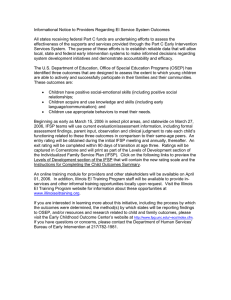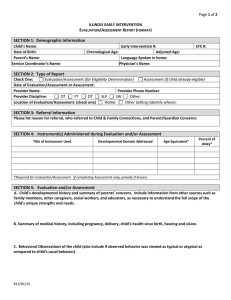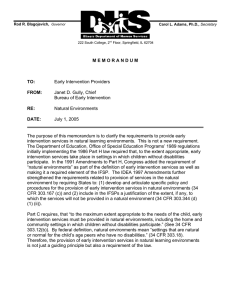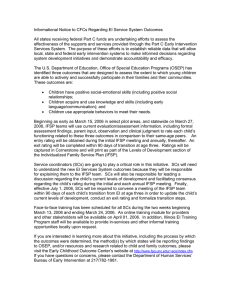INFORMATIONAL NOTICE TO: FROM:
advertisement
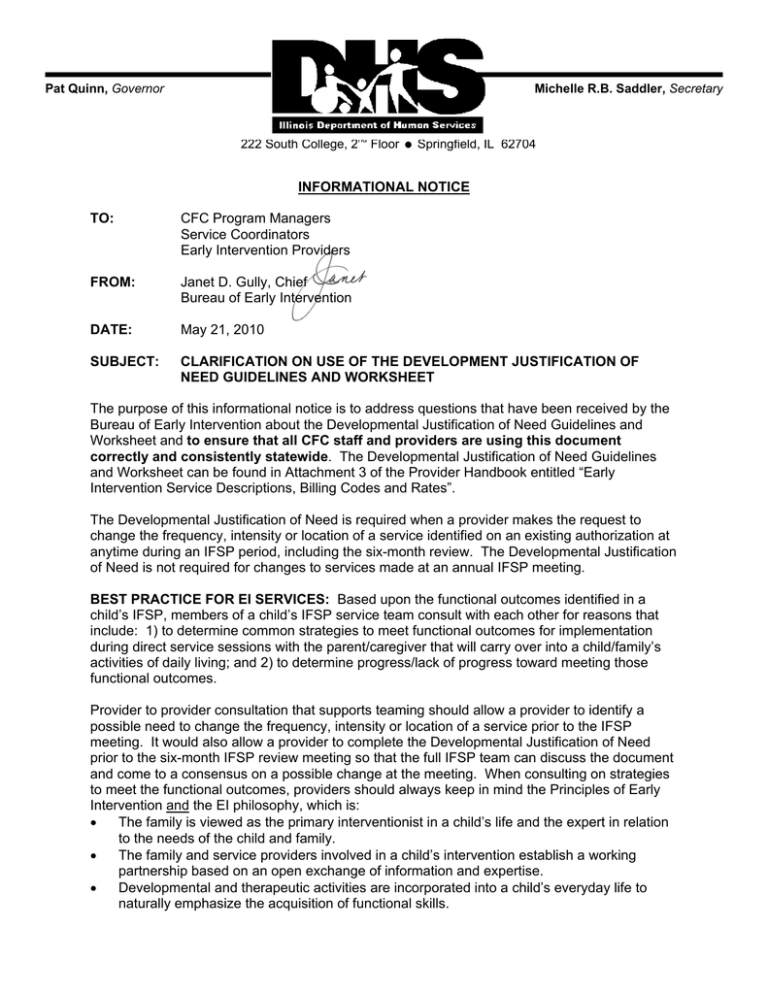
1 Pat Quinn, Governor Michelle R.B. Saddler, Secretary 222 South College, 2nd Floor Springfield, IL 62704 INFORMATIONAL NOTICE TO: CFC Program Managers Service Coordinators Early Intervention Providers FROM: Janet D. Gully, Chief Bureau of Early Intervention DATE: May 21, 2010 SUBJECT: CLARIFICATION ON USE OF THE DEVELOPMENT JUSTIFICATION OF NEED GUIDELINES AND WORKSHEET The purpose of this informational notice is to address questions that have been received by the Bureau of Early Intervention about the Developmental Justification of Need Guidelines and Worksheet and to ensure that all CFC staff and providers are using this document correctly and consistently statewide. The Developmental Justification of Need Guidelines and Worksheet can be found in Attachment 3 of the Provider Handbook entitled “Early Intervention Service Descriptions, Billing Codes and Rates”. The Developmental Justification of Need is required when a provider makes the request to change the frequency, intensity or location of a service identified on an existing authorization at anytime during an IFSP period, including the six-month review. The Developmental Justification of Need is not required for changes to services made at an annual IFSP meeting. BEST PRACTICE FOR EI SERVICES: Based upon the functional outcomes identified in a child’s IFSP, members of a child’s IFSP service team consult with each other for reasons that include: 1) to determine common strategies to meet functional outcomes for implementation during direct service sessions with the parent/caregiver that will carry over into a child/family’s activities of daily living; and 2) to determine progress/lack of progress toward meeting those functional outcomes. Provider to provider consultation that supports teaming should allow a provider to identify a possible need to change the frequency, intensity or location of a service prior to the IFSP meeting. It would also allow a provider to complete the Developmental Justification of Need prior to the six-month IFSP review meeting so that the full IFSP team can discuss the document and come to a consensus on a possible change at the meeting. When consulting on strategies to meet the functional outcomes, providers should always keep in mind the Principles of Early Intervention and the EI philosophy, which is: • The family is viewed as the primary interventionist in a child’s life and the expert in relation to the needs of the child and family. • The family and service providers involved in a child’s intervention establish a working partnership based on an open exchange of information and expertise. • Developmental and therapeutic activities are incorporated into a child’s everyday life to naturally emphasize the acquisition of functional skills. 2 Questions and Answers: 1) Q: If it is recommended at a six month IFSP review meeting that a change should be made to the frequency, intensity or location of a service, does the Developmental Justification of Need worksheet still have to be completed? A: Yes. If the Developmental Justification of Need worksheet was not completed and submitted prior to the six month IFSP review meeting, and at the meeting the team makes the decision to change the frequency, intensity or location of an existing authorization, it is the responsibility of the team to complete the worksheet at the meeting. The team would discuss the need for a change based upon the Principles of Early Intervention and the IFSP functional outcomes. A member of the IFSP team, excluding the parent(s) and service coordinator, becomes the writer of the document on behalf of the team. This document must be completed prior to the service coordinator making any changes to the IFSP in concerns to services, and prior to any changes being made to an existing authorization. If the document is handwritten at the IFSP meeting, it must be fully completed and readable and understandable to anyone who would audit or review the child’s CFC permanent record. The service coordinator will not accept an incomplete or illegible Developmental Justification of Need and will not change the frequency, intensity or location of existing authorizations if the change that is requested is not in compliance with EI policy and procedure and the Principles of Early Intervention. 2) Q: What is the Department’s stance regarding the format for the justification document? Do they prefer providers to fill in the worksheet, or develop a report addressing the questions from the worksheet? A: The provider should develop a report that addresses all components of the Worksheet, including the questions. The Developmental Justification of Need is a format not a form. Each section/question on the format must be addressed. Service Coordinators will not accept incomplete justifications or justifications that request change’s that are not in compliance with EI policy and procedure and the Principles of Early Intervention. Providers should complete the Developmental Justification of Need Worksheet in the following manner. • • • Sections 1, 2 and 3 must be completed as presented in the format. Section 4, For an increase in frequency or intensity or change of location, providers should respond to all six of the Early Intervention Principles listed. For a decrease in services or if the provider has found the child age appropriate and is recommending that the child be discharged from services, the provider is only required to address the last statement found under Principle #4. In Section 4, the minimal response for each principle includes the following: Principle number A “Written Justification” in response to the questions/directives provided under the “Information Required to Justify This Principle.” Although you need to read and respond to the principles and the questions/directives provided in the “Information Required to Justify This Principle” column, you do not need to include this language and maintain the 3-column chart in Section 4. The document 3 should be typed in a font large enough for the document to be read and understood unless it is created at the six-month review meeting. If the document is handwritten at the meeting, the document must be legible, readable and understandable to anyone who would audit or review the child’s CFC permanent record. 3) Q: If a provider wants to discharge a child do they need to complete both a discharge report and a report that addresses principle #4 or can these be combined? A: These can be combined. The completion of Sections 1, 2, 3 and the last statement found under principle # 4 in Section 4 of the Developmental Justification of Need is all that is required. The submission of a completed document that is accepted by the service coordinator would serve the function of a discharge report and would also allow the IFSP review meeting to be scheduled. 4) Q: If a provider wants to discharge a child and has submitted a completed Developmental Justification of Need, does and IFSP meeting still need to be held? A: Yes. The service coordinator must convene a meeting of the child’s IFSP team to discuss and document progress toward IFSP functional outcomes and EI levels of development/child outcomes. 5) Q: Does the “Child and Family Connections Justification To Change Frequency, Intensity, or Location” form still need to be completed in addition to the Developmental Justification of Need Worksheet? A: Yes. Child and Family Connections offices are still required to complete the “Child and Family Connections Justification To Change Frequency/Intensity/Location” form with the IFSP team at the end of each IFSP review meeting that is held to change the frequency, intensity or location of an existing authorization. Before an IFSP review meeting can be held that would require the use of this form, a provider must first submit a written “Developmental Justification of Need” that addresses all required components identified in the Developmental Justification of Need Guidelines/Worksheet. 6) Q: If the child is only receiving a re-assessment in six months and at the six-month review meeting the therapist wants to add direct service, do we need to complete the justification form? A: No. A Developmental Justification of Need is not needed to add a new service to an existing IFSP. The decision to add a new service to an existing IFSP is a team decision, not an individual provider decision. Therefore, the IFSP team must agree that the additional service is needed. If the IFSP team agrees, the new service must be based upon the Principles of Early Intervention and be tied to a functional outcome that cannot be met by other members of the existing service team prior to determining frequency, intensity and duration of the proposed new service. 7) Q: If a provider is looking to change BOTH frequency and location, can both these issues be addressed in one justification worksheet/report? Or are two documents necessary—one to address location and the other frequency? A: Yes. Both may be addressed in one Developmental Justification of Need. In addition, if a recommendation is made to change the location to a non-natural environment, the Natural Environment Worksheet will need to be completed at the IFSP 4 review meeting. Service coordinators will not authorize services in a non-natural environment unless the IFSP team can justify the services based upon the “acceptable” column of the worksheet. 8) Q: What if the family wants to decrease or stop services. Is this form needed? A: No, UNLESS the family is making the request to discontinue services because the provider has told the family that their child has met outcomes and is now age appropriate and that is the reason for the request to discontinue services. In that case a Developmental Justification of Need would be needed and an IFSP meeting would need to be convened to discuss and document progress toward IFSP functional outcomes and EI levels of development/child outcomes. If the family chooses to decrease or stop services due to other reasons not identified above, the Developmental Justification of Need is not required. Per Part C of IDEA, a family can stop or decline a service at any time. 9) Q: Does an IFSP review meeting have to be held to make these changes or do we just have to create the document and submit it to the service coordinator? A: Yes. An IFSP review meeting must be held to make any changes to the frequency, intensity or location of an existing authorization or to discharge a child. This is not a new policy. All changes must be based upon the Principles of Early Intervention and must be tied to functional outcomes. In addition, if a child will be discharged due to meeting functional outcomes and/or age appropriate, an IFSP meeting would need to be convened to discuss and document progress toward IFSP functional outcomes and EI levels of development/child outcomes. 10) Q: Are all team members required to attend an IFSP meeting to add services? A: Yes. Services are added to an IFSP based upon the completion of functional outcomes generated by the “IFSP TEAM”. Once the functional outcomes have been written, it is the responsibility of the IFSP TEAM to determine the services most appropriate to meet those outcomes. It is “TEAM” decision and not the responsibility of one person. 11) Q: Does the provider complete the Developmental Justification of Need for a child turning 3 years of age and is being discharged from EI? A: No. A provider is only required to generate a discharge summary when a child transitions out of EI at age 3 unless the provider has administered a formal assessment tool and is billing for an assessment. If that occurs, the provider would also be required to generate a written report in the EI report format. 12) Q: Is it appropriate for a provider to complete a Developmental Justification of Need to request a change to the frequency, intensity or location of services based upon a medical diagnosis or medical condition that recommends that a child receive acute rehabilitative therapy or therapy required as part of a medical procedure, medical intervention or injury? A: No. This type of service is considered to be medically based, not developmentally based, and should fall under the guidance of a physician. Early Intervention is a developmental program governed by Education. Once a condition has become chronic 5 or sub-acute, EI will authorize services in a child’s natural environment that address ongoing developmental delays. Children who require acute rehabilitative therapy or therapy required as part of a medical procedure, medical intervention or injury should be referred to medical resources for medical services, which fall outside of the auspices of Early Intervention. If you have questions about this Informational Notice please contact the Child and Family Connections Office that you work most closely with or you may submit you questions via email to Jennifer.Kepner@illinois.gov. Thank you for your continued participation as a provider of services for the Early Intervention Services System.
